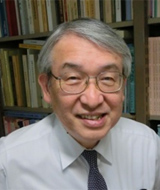Message

(Research Division of Dementia and Neurodegenerative Disease,Nagoya University Graduate School of Medicine
Brain & Mind Research Center, Nagoya University)
Brain protein aging is the greatest and most fundamental factor of dementia. The essential molecular basis of brain protein aging is composed of a loss of physiological function of nervous system and breakdown of neural circuit due to acquisition of toxicity and pathogenicity.
In this research field, we defined the process of toxicity acquisition of functional proteins as “brain protein aging”.
It is expected that qualitative changes of protein qualification and mechanism changes as well as quantitative changes of various molecular changes reside in the background of brain protein aging.
Further, it is expected that various factors such as degradation, excretory mechanism, stress, inflammation, genetic factors exist for controlling and facilitating brain protein aging.
For example, with regard to neurodegenerative diseases such as Alzheimer’s disease, frontotemporal lobar degeneration, dementia with Lewy bodies, brain protein such as Aβ, TDP-43, tau, FUS, alpha-synuclein are aged respectively, physiological functions are lost, mutual interaction with functional molecule are failed, and acquired pathogenicity are accumulated and propagated in neural cells. This mechanism is expected to be a functional molecular basis of neural degeneration, which causes the breakdown of neural circuits and results in the presence of dementia.
However, it is not entirely clarified the process of brain protein aging, the expression of neural toxicity and the mechanism of neural circuit breakdown.
Namely, any solutions about the most fundamental mechanism of neural degeneration have not been yet discovered.
We comprehensively figure out the cause of the brain protein aging process through initiation of transformation at a certain time, functional loss and toxicity acquisition against neural cells, neural circuits breakdown, functional disorder, degeneration and propagation of neural cells, and the process of developing dementia in this research field. Namely, aim of our research is to clarify the mechanism of neural degeneration of brain protein aging on the basis of elucidation of its core molecular basis and to provide a successful strategy for preventing the development of dementia.
This current field comprised “Brain protein aging and neural circuit breakdown (A01), “Molecular basis of brain protein aging (A02), and #Development of therapy for protein aging (A03). The study will take an interdisciplinary approach to analyze chronological changes of brain proteins, in particular, from normal to degeneration and from various angles of molecular to individual levels.
- (1) Clarification of the mechanisms of initiation and pathogenicity of brain protein aging
- (2) Clarification of the mechanisms of aged brain proteins’ intercellular transmission and infectiveness
- (3) Clarification of the mechanisms of pathogenicity acquired by aged brain proteins and its inhibition and the development of clinical markers
- (4) Visualization of brain protein aging and clarification of the mechanisms of neural circuit breakdown.
In this research field, we promote our research in collaboration with diversified researchers from basic to clinical fields with new perspectives and methods. In addition, we concentrate the next generation technologies, aiming at developing novel research fields of brain protein aging. Our integrated research field of various academic fields will surely lead to epoch-making developments in brain protein aging.

